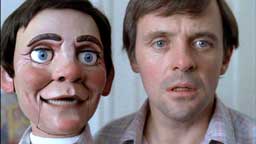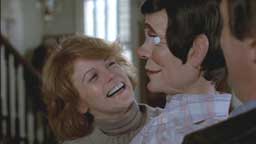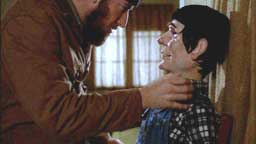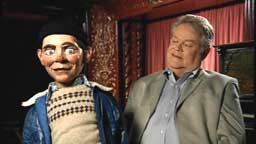 MAGIC
(1978)
MAGIC
(1978)Feature films
involving sinister ventriloquist’s dummies included THE UNHOLY THREE (filmed
in 1925 and 1930, both with Lon Chaney Sr.), THE GREAT GABBO (1929, with Erich
von Stroheim), the last segment of DEAD OF NIGHT (1945, with Michael Redgrave)
and DEVIL DOLL (1963, with Bryant Haliday). So this type of yarn was nothing
new by 1978, the year that ace producer Joseph E. Levine (the man who brought
HERCULES and GODZILLA to the States) and his brother Richard elected to adapt
celebrated author William Goldman’s novel Magic to the big screen,
as they scored a hit collaboration with Goldman a year earlier with A BRIDGE
TOO FAR. Originally released by 20th Century Fox, MAGIC was a cable TV and prime
time network (NBC) staple, but aside from a few subsequent airings, it has been
out of circulation here since it was released on VHS and laserdisc many moons
ago. Dark Sky Films has now rescued MAGIC from obscurity, and doubtless it will
be one of their biggest DVD sellers yet.
Third-rate nightclub magician Corky Withers (Anthony Hopkins) finally finds success when he adds Fats, a wisecracking foul-mouthed ventriloquist's dummy, to his act. Corky’s agent Ben Greene (Burgess Meredith) offers him a chance to do a TV pilot for NBC, but Corky turns it down when he is told he’ll have to take a medical exam, and subsequently hides out. He arrives at his quiet, suburban hometown where he lodges at the vacant inn run by Peggy Ann Snow (Ann-Margaret), an old high school friend he never had the nerve to ask out, but now starts an affair with. Increasingly, Fats’ personality is taking over Corky, not only enabling him to win over the married Peggy, but causing him to do the unthinkable when the persistent Ben shows up, and later, when Peg’s jealous husband Duke (Ed Lauter) comes back home.
 Many
filmgoers sit on the fence as to where MAGIC’s merit stands. Personally,
for a film that boasts such “A” level talent, this reviewer finds
the film to be an average psychological thriller. Richard Attenborough’s
direction, sans for several tense sequences, seems uninspired, and Goldman’s
story breathes with the familiarity of an old (albeit extended) “Twilight
Zone” script. Granted, Hopkins is a gifted actor, and his turn as schizophrenic
whose dummy acts as his malevolent alter ego, is superb especially taking into
account that he voiced Fats and effortlessly plays Corky as a dud of a person
increasingly descending into madness. Victor J. Kemper’s gloomy cinematography
adds an eerie mood for the quiet small-town setting, as does Jerry Goldsmith’s
usual capable score, and the supporting cast is also worthy of note, with the
always lovely Ann-Margaret in an appealing role (though she’s decidedly
underused). For all you “celebrity skin” addicts, Margaret does
a brief topless scene, and her ample bosom is the butt of more than a few jokes,
mostly from the mouth of Fats.
Many
filmgoers sit on the fence as to where MAGIC’s merit stands. Personally,
for a film that boasts such “A” level talent, this reviewer finds
the film to be an average psychological thriller. Richard Attenborough’s
direction, sans for several tense sequences, seems uninspired, and Goldman’s
story breathes with the familiarity of an old (albeit extended) “Twilight
Zone” script. Granted, Hopkins is a gifted actor, and his turn as schizophrenic
whose dummy acts as his malevolent alter ego, is superb especially taking into
account that he voiced Fats and effortlessly plays Corky as a dud of a person
increasingly descending into madness. Victor J. Kemper’s gloomy cinematography
adds an eerie mood for the quiet small-town setting, as does Jerry Goldsmith’s
usual capable score, and the supporting cast is also worthy of note, with the
always lovely Ann-Margaret in an appealing role (though she’s decidedly
underused). For all you “celebrity skin” addicts, Margaret does
a brief topless scene, and her ample bosom is the butt of more than a few jokes,
mostly from the mouth of Fats.
There are no complaints as far as Dark Sky Films’ excellent transfer is concerned. Mastered in High Definition from the original 35mm negative, the film is presented in its original 1.85:1 theatrical ratio with anamorphic enhancement. For a film made nearly 30 years ago, the colors here are rich, with pleasant, realistic flesh tones. There is a sharp level of detail throughout, with very little in the way of grain, and no blemishes to be found. The Dolby Digital 2.0 mono soundtrack serves the film well, and optional English subtitles are included.
 The
disc has been furnished with some nifty extras, most notably a featurette entitled
“Fats and Friends” (26 minutes) directed by Blue Underground’s
David Gregory. Commencing with an interesting history of ventriloquism in vaudeville
and in movies, it embodies an excellent interview with Dennis Alwood, the real-life
ventriloquist who designed Fats and consulted Hopkins during the shoot. Alwood
chats with the Fats dummy in hand, and amusingly recreates the character for
the cameras. He discusses how Fats was originated as a more friendlier-looking
model named Dudley, and also shares some great behind-the-scenes stories including
that Jack Nicholson was originally slated to star (he refused to wear a hairpiece)
and that early on, Norman Jewison was to direct! Another featurette which lasts
about 12 minutes long is a concrete interview with cinematographer Victor J.
Kemper, who explains the kind of mood and atmosphere he was trying to create
while shooting the film. A brief vintage radio interview with Hopkins is visually
accompanied by some rare outtakes/bloopers, and another vintage filmed interview
with him has him conversing with a Spanish-speaking journalist on the set of
the film. Also included is a silent make-up screen test with Ann-Margaret, the
original theatrical trailer, a still gallery (including some candid Polaroids
of Fats’ head in various stages of creation) radios spots in Spanish and
English, and TV spots in Spanish and English. The TV spot where Fats reads a
macabre poem in close-up (“Abracadabra, I sit on his knee. Presto, changeo,
and now he's me! Hocus Pocus, we take her to bed. Magic is fun; we're dead.”)
scared the crap out of most of the kids who caught it on the tube at the time.
(George
R. Reis)
The
disc has been furnished with some nifty extras, most notably a featurette entitled
“Fats and Friends” (26 minutes) directed by Blue Underground’s
David Gregory. Commencing with an interesting history of ventriloquism in vaudeville
and in movies, it embodies an excellent interview with Dennis Alwood, the real-life
ventriloquist who designed Fats and consulted Hopkins during the shoot. Alwood
chats with the Fats dummy in hand, and amusingly recreates the character for
the cameras. He discusses how Fats was originated as a more friendlier-looking
model named Dudley, and also shares some great behind-the-scenes stories including
that Jack Nicholson was originally slated to star (he refused to wear a hairpiece)
and that early on, Norman Jewison was to direct! Another featurette which lasts
about 12 minutes long is a concrete interview with cinematographer Victor J.
Kemper, who explains the kind of mood and atmosphere he was trying to create
while shooting the film. A brief vintage radio interview with Hopkins is visually
accompanied by some rare outtakes/bloopers, and another vintage filmed interview
with him has him conversing with a Spanish-speaking journalist on the set of
the film. Also included is a silent make-up screen test with Ann-Margaret, the
original theatrical trailer, a still gallery (including some candid Polaroids
of Fats’ head in various stages of creation) radios spots in Spanish and
English, and TV spots in Spanish and English. The TV spot where Fats reads a
macabre poem in close-up (“Abracadabra, I sit on his knee. Presto, changeo,
and now he's me! Hocus Pocus, we take her to bed. Magic is fun; we're dead.”)
scared the crap out of most of the kids who caught it on the tube at the time.
(George
R. Reis)